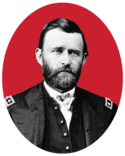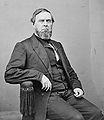| 1868 presidential election | |
  Nominees Nominees Grant and Colfax | |
| Convention | |
|---|---|
| Date(s) | May 20–21, 1868 |
| City | Chicago, Illinois |
| Venue | Crosby's Opera House |
| Candidates | |
| Presidential nominee | Ulysses S. Grant of Illinois |
| Vice-presidential nominee | Schuyler Colfax of Indiana |
| ‹ 1864 · 1872 › | |
The 1868 Republican National Convention of the Republican Party of the United States was held in Crosby's Opera House, Chicago, Cook County, Illinois, on May 20 to May 21, 1868. Ulysses S. Grant won the election and became the 18th president of the United States.
Commanding General of the U.S. Army Ulysses S. Grant was the unanimous choice of the Republican convention delegates for president. For vice president the delegates chose Speaker Schuyler Colfax, who was Grant's choice. In Grant's acceptance telegram, a letter to then President of the Republican National Convention Joseph R. Hawley, Grant said "Let us have peace",.
Background
Republicans, led by their Radical faction, had scored decisive victories in the 1866 elections. If that trend continued in the 1867 elections, then the party's presidential nomination would likely go to a Radical like Chief Justice Salmon P. Chase or Senator Benjamin Wade. Chase had the support of important figures like Senator Charles Sumner and financier Jay Cooke. More moderate Republicans, such as Senator William P. Fessenden, Charles Francis Adams Jr., and The New York Times, had interpreted the 1866 elections not as a mandate for radicalism, but as a rejection of President Andrew Johnson's programs and personality; therefore, they were wary of a Radical nominee.
The Grant candidacy, though, took on momentum in the wake of the state elections in 1867. The electorate rejected the Radical Republican agenda by voting for Democratic control in the key Northern states of New York, Pennsylvania, and Ohio, and by rejecting black manhood suffrage amendments in Kansas and Ohio. The election results bolstered the case of the moderate Republicans and seemed to close the door to a Radical nominee. Georges Clemenceau, a Paris Temps journalist who would later be the French premier, reported accurately that "The real victims of the victory of the Democrats are Mr. Wade and Mr. Chase."
Presidential nomination
Presidential candidates
-
 Commanding General
Commanding General
Ulysses S. Grant
of Illinois -
 Chief Justice
Chief Justice
Salmon P. Chase
of Ohio
(Speculated) -
 President pro tempore
President pro tempore
Benjamin Wade
of Ohio
(Speculated)
As Republicans convened in Chicago in May 1868, Grant had no serious opposition for the nomination; he was nominated unanimously on the first ballot.
| Presidential Balloting | |
|---|---|
| Candidate | 1st |
| Grant | 648 |
| Absent | 2 |
Presidential Balloting / 2nd Day of Convention (May 21, 1868)
Vice presidential nomination
Vice presidential candidates
-
 Speaker
Speaker
Schuyler Colfax
of Indiana -
 President Pro Tempore
President Pro Tempore
Benjamin Wade
of Ohio -
 Governor
Governor
Reuben Fenton
of New York -
 Senator
Senator
Henry Wilson
of Massachusetts -
 Former Governor
Former Governor
Andrew Curtin
of Pennsylvania -
 Former Vice President
Former Vice President
Hannibal Hamlin
of Maine -
 Former Attorney General James Speed
Former Attorney General James Speed
of Kentucky -
 Senator
Senator
James Harlan
of Iowa -
 Former Senator
Former Senator
John Creswell
of Maryland -
 Senator
Senator
Samuel C. Pomeroy
of Kansas -
 Representative
Representative
William D. Kelley
of Pennsylvania
(Improper Nomination)
Colfax was selected for vice president on the fifth ballot. Colfax was popular among Republicans for his friendly character, party loyalty, and Radical views on Reconstruction. Wilson received a large amount of support from the southern delegations.
| Vice Presidential Ballot | ||||||
|---|---|---|---|---|---|---|
| 1st | 2nd | 3rd | 4th | 5th (Before Shifts) | 5th (After Shifts) | |
| Colfax | 115 | 145 | 165 | 186 | 226 | 541 |
| Wade | 147 | 170 | 178 | 206 | 207 | 38 |
| Fenton | 126 | 144 | 139 | 144 | 139 | 69 |
| Wilson | 119 | 114 | 101 | 87 | 56 | 0 |
| Curtin | 51 | 45 | 40 | 0 | 0 | 0 |
| Hamlin | 28 | 30 | 25 | 25 | 20 | 0 |
| Speed | 22 | 0 | 0 | 0 | 0 | 0 |
| Harlan | 16 | 0 | 0 | 0 | 0 | 0 |
| Creswell | 14 | 0 | 0 | 0 | 0 | 0 |
| Pomeroy | 6 | 0 | 0 | 0 | 0 | 0 |
| Kelley | 4 | 0 | 0 | 0 | 0 | 0 |
| Absent | 2 | 2 | 2 | 2 | 2 | 2 |
Vice Presidential Balloting / 2nd Day of Convention (May 21, 1868)
-
 1st
1st
Vice Presidential Ballot -
 2nd
2nd
Vice Presidential Ballot -
 3rd
3rd
Vice Presidential Ballot -
 4th
4th
Vice Presidential Ballot -
 5th
5th
Vice Presidential Ballot
(Before Shifts) -
 5th
5th
Vice Presidential Ballot
(After Shifts)
See also
- 1868 United States presidential election
- 1868 Democratic National Convention
- History of the United States Republican Party
- List of Republican National Conventions
- United States presidential nominating convention
References
- "Letter to Joseph R. Hawley, President National Union Republican Convention, Accepting the Presidential Nomination | The American Presidency Project". www.presidency.ucsb.edu. Retrieved October 31, 2022.
- ^ Joseph E. Delgatto, Indiana Journal Hall of Fame, Schuyler Colfax 1966
- Abbott 1986, p. 173.
Works cited
- Abbott, Richard (1986). The Republican Party and the South, 1855-1877: The First Southern Strategy. University of North Carolina Press. ISBN 0807816809.
External links
| Preceded by 1864 Baltimore |
Republican National Conventions | Succeeded by 1872 Philadelphia |
- Republican Party Platform of 1868 at The American Presidency Project
| (← 1864) 1868 United States presidential election (1872 →) | |||||
|---|---|---|---|---|---|
| Republican Party (Convention) |
| ||||
| Democratic Party (Convention) |
| ||||
| Ulysses S. Grant | |||||||||
|---|---|---|---|---|---|---|---|---|---|
| 18th President of the United States (1869–1877) | |||||||||
| Military career | |||||||||
| Presidency |
| ||||||||
| Post-presidency | |||||||||
| Books | |||||||||
| Life | |||||||||
| Elections |
| ||||||||
| Legacy |
| ||||||||
| Family |
| ||||||||
| Reconstruction era | |||||||||||||||||||||||||||||||||||
|---|---|---|---|---|---|---|---|---|---|---|---|---|---|---|---|---|---|---|---|---|---|---|---|---|---|---|---|---|---|---|---|---|---|---|---|
| Participants |
| ||||||||||||||||||||||||||||||||||
| Elections |
| ||||||||||||||||||||||||||||||||||
| Key events |
| ||||||||||||||||||||||||||||||||||
| Aspects |
| ||||||||||||||||||||||||||||||||||
